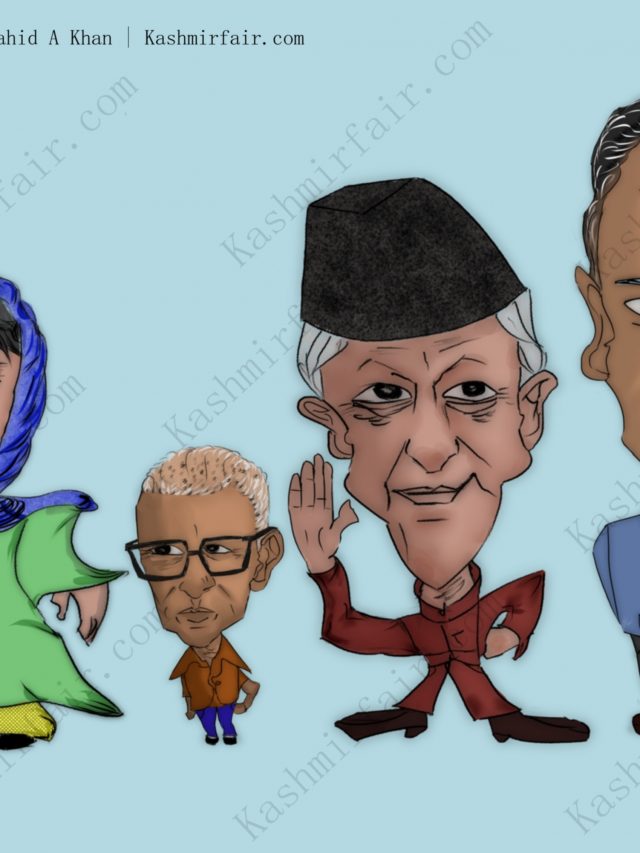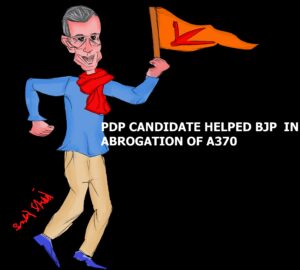The Gupkar Alliance and The Lok Sabha Elections
In the picturesque region of Jammu and Kashmir, politics has always been a complex interplay of regional identities, ideologies, and power struggles. The recent Lok Sabha elections in 2024 witnessed significant shifts, particularly concerning the Gupkar Alliance – a coalition formed by the National Conference (NC) and the Peoples Democratic Party (PDP). Let’s delve into the key players and their roles:
The Gupkar Alliance: Origins and Purpose The Gupkar Alliance and The Lok Sabha Elections
The Gupkar Alliance emerged in 2020 as a response to the abrogation of Article 370 and the reorganization of Jammu and Kashmir into a Union territory. This alliance brought together various mainstream parties, including the NC and the PDP, with a common goal: the restoration of Jammu and Kashmir’s special status. Although not an electoral alliance, both parties jointly contested the 2020 district development council elections, garnering significant support from the people of the Kashmir Valley
Mehbooba Mufti: A Turbulent Journey
Mehbooba Mufti, the former Chief Minister of Jammu and Kashmir, played a pivotal role in the Gupkar Alliance. Her party, the PDP, had strong roots in the Anantnag-Rajouri parliamentary constituency. This region was represented twice by Mehbooba Mufti herself and once by her late father, Mufti Mohammad Sayeed. It was considered the PDP’s home turf, and their political fortunes were closely tied to it.
However, tensions within the alliance escalated when the NC decided to field its candidate from the same high-stakes constituency. The PDP saw this move as a betrayal and felt compelled to contest the elections independently. Mehbooba Mufti expressed her frustration, stating that they had no other option but to field candidates and compete against their former allies
Farooq Abdullah: The Veteran Leader
Farooq Abdullah, the seasoned leader of the NC, has been a prominent figure in Jammu and Kashmir politics for decades. His party’s decision to contest separately from the PDP marked a significant shift. The Anantnag-Rajouri constituency, which was once a stronghold for the PDP, now became a battleground for both parties. Farooq Abdullah’s leadership played a crucial role in shaping this decision, emphasizing the need for individual party identities and strategies.
Omar Abdullah
Omar Abdullah, the Vice President of the NC, also played a central role. His political rivalry with Mehbooba Mufti took a backseat when they joined forces in the Gupkar Alliance. However, the recent split highlighted the underlying tensions. Omar Abdullah’s decision to contest separately reflected the changing dynamics within the alliance. As the next-generation leader, he faced the challenge of balancing party interests with broader regional aspirations.
Implications and Beyond
The decision by the NC and the PDP to contest separately has significant implications. First, it divides the vote share between the two regional players, potentially benefiting the Bharatiya Janata Party (BJP) in the Anantnag-Rajouri constituency. Second, it symbolizes the end of the spirit of the Gupkar Alliance – a unity forged against New Delhi’s policies. While the alliance may continue as mere rhetoric in the media, its practical impact has waned
In conclusion, the 2024 Lok Sabha elections in Jammu and Kashmir witnessed a seismic shift as old alliances crumbled. The political landscape remains fluid, and the fate of the region hangs in the balance. As voters cast their ballots, they do so against a backdrop of fractured alliances and evolving loyalties.
why some people might apply traitor label to politicians like Mehbooba Mufti, Farooq Abdullah, and Omar Abdullah in the context of Jammu and Kashmir.
- The perception of someone as a traitor depends on the context. In the case of Jammu and Kashmir, the political landscape has been shaped by decades of conflict, regional aspirations, and complex historical events.2.
- The abrogation of Article 370 in 2019, which revoked Jammu and Kashmir’s special status, intensified political divisions. Some saw it as a necessary step for national integration, while others viewed it as an attack on the region’s autonomy3.
- Supporters of the Gupkar Alliance (including Mehbooba Mufti, Farooq Abdullah, and Omar Abdullah) argue that they are defending the rights and identity of the people of Jammu and Kashmir4.
- Critics, on the other hand, accuse them of obstructing development, promoting separatism, and prioritizing their own political interests over the welfare of the region
- Reasons for Labeling as Traitors:
- Shifts in Alliances: The recent split within the Gupkar Alliance, where the NC and the PDP contested separately, led to accusations of betrayal. Supporters felt let down by the disintegration of a united front against the central government’s policies.
- Statements and Actions:Statements made by these leaders, especially during times of unrest, have been scrutinized. For instance, Mehbooba Mufti’s remarks about the Indian flag and Farooq Abdullah’s statements on China’s role in Kashmir have sparked controversy.
Complex Realities:
- Politics is rarely black and white. These leaders have navigated a challenging terrain, balancing regional aspirations, electoral politics, and national interests.
- Their decisions are influenced by pragmatic considerations, electoral dynamics, and the need to maintain relevance in a rapidly changing political landscape.
Historical Precedents:
- Throughout history, leaders who negotiate with the ruling power while advocating for their people’s rights have faced accusations of betrayal. This tension between pragmatism and idealism is not unique to Jammu and Kashmir.
In summary, whether one views these leaders as traitors or defenders of their community depends on individual perspectives, political affiliations, and the lens through which they interpret complex events. It’s essential to recognize that political labels are often oversimplifications, and the reality is far more nuanced. As observers, we should engage in informed discussions rather than resorting to divisive labels.
The Significance of 2024 Lok Sabha Elections in Jammu and Kashmir
The 2024 Lok Sabha elections in Jammu and Kashmir hold immense significance due to several factors, and the Gupkar Alliance has positioned itself as a key player in this electoral battle. Let’s explore why these elections matter and why the Gupkar Alliance is committed to fighting for the restoration of Article 370:
Abrogation of Article 370:
- In 2019, the Indian government revoked Article 370, which granted special autonomous status to Jammu and Kashmir.
- This decision fundamentally altered the region’s political landscape, leading to widespread debates, protests, and legal challenges.
BJP’s Ambitious Target:
- The Bharatiya Janata Party (BJP) has set an ambitious goal of winning 370 Lok Sabha seats in the 2024 elections.
- The scrapping of Article 370 has become a central issue for the BJP, and they aim to build a positive narrative around this decision.
Gupkar Alliance’s Formation:
- The People’s Alliance for Gupkar Declaration (PAGD) emerged as a coalition of regional parties in Jammu and Kashmir.
- Its primary objective is to advocate for the restoration of Jammu and Kashmir’s special status under Article 370 and Article 35A of the Indian Constitution.
Gupkar Declaration and Unity:
- The Gupkar Declaration was a significant moment when regional leaders, including Farooq Abdullah, Mehbooba Mufti, and others, came together to oppose the abrogation of Article 370.
- The alliance aimed to protect the region’s unique identity, autonomy, and rights.
Electoral Battle and Seat-Sharing:
- The PAGD’s biggest members are the Jammu & Kashmir National Conference (NC) and the Jammu & Kashmir People’s Democratic Party (PDP).
- However, in the 2024 Lok Sabha elections, these two parties find themselves pitted against each other in key constituencies like Anantnag-Rajouri, Srinagar, and Baramulla.
- Both the BJP and Congress have decided not to field candidates in these contested seats, making the electoral battle intense1.
Importance of Jammu and Kashmir Elections:
- These elections will determine parliamentary representation from the region.
- The outcomes will significantly influence the trajectory of development, governance, and political dynamics in Jammu & Kashmir2.
- The Gupkar Alliance’s performance will be closely watched as it seeks to maintain its hold and advocate for the restoration of Article 3703.
In summary, the 2024 Lok Sabha elections in Jammu and Kashmir are pivotal due to the historical context of Article 370, the BJP’s ambitious goals, and the Gupkar Alliance’s commitment to preserving the region’s special status.
The participation of politicians in Lok Sabha elections, even when they know that restoring Article 370 is unlikely, can be understood through several reasons:
Political Representation:
- Symbolic Stand: By participating in elections, politicians signal their commitment to representing their constituents and their political ideologies. Even if the restoration of Article 370 seems improbable, they continue to engage in the democratic process.
- Voice for Their Base: The Gupkar Alliance and The Lok Sabha Elections: These politicians believe that their presence in Parliament allows them to advocate for the interests of their region and community. They can raise issues, debate policies, and hold the central government accountable.
Electoral Politics:
- Local and National Relevance: Elections provide a platform for politicians to maintain their relevance both locally and nationally. Even if their specific demands (like Article 370 restoration) face challenges, they can still influence other policy matters.
- Party Dynamics:Political parties often strategize based on electoral calculations. Contesting elections allows parties to maintain their organizational structure, mobilize supporters, and build a base for future endeavors
Public Perception and Legitimacy:
- Legitimacy of Leadership: Participation in elections reinforces the legitimacy of political leaders. Voters perceive those who contest elections as legitimate representatives, regardless of the outcomes.
- Credibility and Trust: Politicians who engage in electoral processes gain credibility and trust among their followers. It demonstrates their commitment to democratic norms.
Platform for Advocacy:
- National Stage: Lok Sabha elections provide a national stage for politicians to voice their concerns. They can use parliamentary debates, media interactions, and public forums to highlight regional issues.
- Negotiation and Bargaining:Even if Article 370 restoration is unlikely, politicians can negotiate with the central government on other matters. Participation in elections strengthens their bargaining position.
Strategic Calculations:
- Long-Term Goals: Some politicians may view electoral participation as part of a long-term strategy. They may hope for shifts in political dynamics or changes in public sentiment over time.
- Coalition Building: Participation allows politicians to forge alliances, build networks, and collaborate with other parties. These alliances can influence policy decisions beyond Article 370.
In summary, while the restoration of Article 370 remains a contentious issue, politicians participate in Lok Sabha elections for multifaceted reasons. Their actions are shaped by political dynamics, strategic considerations, and their commitment to democratic processes.
Note: The above analysis is based on general principles and does not specifically address any individual politician.






